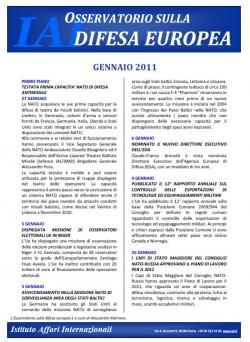Observatory on European defence, November 2010
IN THE SPOTLIGHT: November 19-20,2010
NATO APPROVES THE NEW STRATEGIC CONCEPT AND SIGNS A PARTNERSHIP AGREEMENT WITH AFGHANISTAN
The Heads of State and Government of NATO countries in Lisbon have approved the new Strategic Concept of the Alliance. The document contains guidelines for the action of NATO in the next decade. It comes with the “Lisbon Declaration” which details its implementation and will be updated in every following Atlantic summit.
The Strategic Concept entrusts NATO with three fundamental tasks. The first is the collective defense of member states against military aggressions and other threats of the national security, including missile threats. The second task is crisis management, from prevention to post-conflict stabilization, including military operations outside the euro-Atlantic area. Finally, the pursuit of "cooperative security", a broad approach that includes all-around partnerships with third countries and international organizations, the "open door" policy for future enlargements of NATO and efforts on the arms control and non-proliferation.
Also in Lisbon, a meeting of the NATO-Russia Council at the level of Heads of State and Government has approved the joint analysis of threats, conducted by the Allied nations and the Russian Federation. The Council has also initiated a joint assessment of the missile threat and it has resumed the cooperation on theater missile defense. The NATO-Russia cooperation on Afghanistan has also been extended.
Finally, NATO and the Afghan government have signed in Lisbon a strategic partnership declaration, that sets the security cooperation in the medium and long term in parallel with the future transition of the ISAF mission in Afghanistan.
November 2, 2010
FRANCE AND UNITED KINGDOM SIGN AN AGREEMENT ON DEFENCE COOPERATION
British Prime Minister Cameron and French President Sarkozy have signed in London a series of agreements on bilateral cooperation in the defense field. The agreements include: the sharing of mutual aircraft carriers, which will be used by the air forces of both countries in order to create a joint task force; the gradual creation of a joint "expeditionary" military force of about 5,000 men, capable of conducting high intensity operations, but also available for NATO and EU missions; the cooperation in the management of the respective nuclear deterrent devices, whose performance simulations will be conducted in the laboratory of Valduc (France), while the researches will be conducted in the British centre of Aldermaston.
The agreement also provides for bilateral cooperation on some programs of acquisition and development of military capabilities, such as A400M, Unmanned Air Systems (UAS), missiles, nuclear submarines and communication satellites. France and Britain have also decided to finance, each with € 50 million a year, joint activities on defence research and development.
November 8-9, 2010
EU LIBERALIZES VISAS FOR ALBANIA AND BOSNIA HERZEGOVINA
The EU Justice and Home Affairs Council has authorized Albanians and Bosnia-Herzegovinan citizens to travel in Schengen area without visa. The Council has also put an end to the restrictive measures against Sierra Leone, according to a recent UN decision.
November 17, 2010
THE EU COUNCIL PASSES THE EEAS BUDGET AN STAFF RULES
The EU Council has approved the budget regulations and others for the staff of EEAS (European External Action Service). This organization will have budget autonomy, and its financing will be determined in a specific section of EU budget. With regard to staff, the regulation has been issued about recruiting rules, rights and duties of the officials, and the appointment power from High Representative Catherine Ashton
Lady Ashton has appointed the Swedish diplomat Olof Skoog permanent President of Political and Security Committee (PSC). PSC monitors the international situation in the areas covered by the Common Foreign and Security Policy, and it also exercises strategic control on CFSP missions.
-
Details
Roma, Istituto affari internazionali, 2010, 2p. -
Issue
10/11



